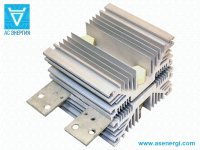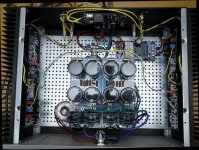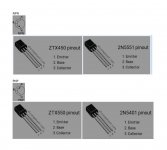Great Build Mrshazbot🙂
What size transformer did you use? I am trying to figure out if a 500va is "enough" or 600va would be better.
How did you wire your termistors? I am assuming this is to prevent having a Soft start module?
Have you used Clarity MKP as your input couplings caps?
/Mikkel
The transformer is a 400VA. If I put the PSU on the front panel then there is plenty of room for a bigger trans.
The thermistors follow 6L6’s protocol from his F5 guide And my understanding is that its an in rush limiter that replaces the soft start (?). There is more of A noticeable sound when turning the switch on and off compared to the F5 build. I don’t want to call it a “thump” because it’s not very strong.
I’ve never used the clarity caps. I have no idea if they help or not but they look cool.... lol.
Thanks for that. I will have a look at the F5 Build.The transformer is a 400VA. If I put the PSU on the front panel then there is plenty of room for a bigger trans.
The thermistors follow 6L6’s protocol from his F5 guide And my understanding is that its an in rush limiter that replaces the soft start (?). There is more of A noticeable sound when turning the switch on and off compared to the F5 build. I don’t want to call it a “thump” because it’s not very strong.
I’ve never used the clarity caps. I have no idea if they help or not but they look cool.... lol.
Yes they do look cool and also receives positiv reviews 🙂 Here is another good comparison of caps: Humble Homemade Hifi - Cap Test
300VA is enough, that’s what the factory Aleph J were built with.
Bigger transformer doesn’t make very much difference overall. It is very good, however, at increasing the total mass of the amplifier! 🙂 🙂 🙂
Thanks 6L6
Hi, guys! How do you think, is it good idea to increase the capacitance of input caps? I am thinking about mundorf mcap evo aluminium oil 3.9uF 450V.
It's not necessary to increase the capacitance, but if you want to try the EVO Aluminum / Oil caps, feel free to do so. Do you use the balanced inputs to your Aleph J?
Capacitor sound is a tricky subject. Here are my two cents...
"High end" end caps may have some merit in passive covers of loudspeakers. For low power applications, such as DC blocking in amp inputs you can use common garden polypropylenes (and save your money for better xover parts).
(Oh, and don't even think of spending money for the exotic Mundorf caps, not even for loudspeaker xovers. They add something weird to the sound.)
"High end" end caps may have some merit in passive covers of loudspeakers. For low power applications, such as DC blocking in amp inputs you can use common garden polypropylenes (and save your money for better xover parts).
(Oh, and don't even think of spending money for the exotic Mundorf caps, not even for loudspeaker xovers. They add something weird to the sound.)
If I could talk to my former self a few years ago I would have just jumpered that cap all together. My pre amps are free of any possible DC leakage. Save some coins in the process too
I'm just thinking about BOM. Now i have two pairs thyristor heatsinks and two 150VA toroid transformers 2x18V 4A. I'm going to order PCBs from diyaudio store.It's not necessary to increase the capacitance, but if you want to try the EVO Aluminum / Oil caps, feel free to do so. Do you use the balanced inputs to your Aleph J?
Input will be non balanced.

Last edited:
Question about earth ground: I've noticed on a few builds a green wire wrapped with a smaller yellow wire (see post 762 for example). What's the reasoning behind this approach? I have a 14 ga wire ready to go for earth ground and wondering if I should add the smaller wire...
Question about earth ground: I've noticed on a few builds a green wire wrapped with a smaller yellow wire (see post 762 for example). What's the reasoning behind this approach? I have a 14 ga wire ready to go for earth ground and wondering if I should add the smaller wire...
I suppose it's to improve safety margin in case of catastrophic failure and there's a substantial current flowing to ground. If this is to happen, I'd expect the weakest link to (hopefully) go open circuit first... a PCB track, MOSFET junction, woofer voice coil... The RCD on the mains' side wouldn't trip for sure.
Question about earth ground: I've noticed on a few builds a green wire wrapped with a smaller yellow wire (see post 762 for example). What's the reasoning behind this approach? I have a 14 ga wire ready to go for earth ground and wondering if I should add the smaller wire...
Can’t find a photo but could it have been a yellow stripe on the green insulation? Our house earth wire in Australia is green with a yellow stripe. I used some for my Aleph J earth.
Another Aleph J comes to life. After reading all of the glowing reports, I built one.
I have built several of the FW amps, and I must say this just might be my favourite.
Presently listening to it with a Korg B1 preamp into a pair of .53x foamcore Karlson speakers.
Really, really nice sound.
More to follow.
Thank you, Nelson, 6L6(Jim), Punkydawgs and XRK971.
I have built several of the FW amps, and I must say this just might be my favourite.
Presently listening to it with a Korg B1 preamp into a pair of .53x foamcore Karlson speakers.
Really, really nice sound.
More to follow.
Thank you, Nelson, 6L6(Jim), Punkydawgs and XRK971.
Attachments
Oops, I just realized it was post 762 in a different Aleph J thread that I was referencing in my question about wrapping two wires for earth ground: Aleph J for Universal Mounting Spec
Green yellow was used because the wire I had on hands was a little small for safety duty and I wanted more conductor. Yellow/green as that’s the most common color for earth worldwide.
details
Working on my aleph J build and a few questions have come up
1. I have an Antek 4220 trafo and recommended is 18V+18V. Mine might be a little hot but is it a problem?
2. There is a part number for Cree Leds and I have lots of leds I could use. Mostly Vishay. I need to get schooled on when I can substitute leds and why it is OK.
Some builds say no substitutes. There are like 2000 led choices on Mouser and I have no idea what I can and can't do. One build I am looking at does not even give part numbers.
3. The BC560C PNP BJT has gone obsolete. Switching to the Zetex BJT. Should I all also flip the NPN BJT to Zetex?
Thank you for your help. Wish I didn't have so many questions.😕
Don
Working on my aleph J build and a few questions have come up
1. I have an Antek 4220 trafo and recommended is 18V+18V. Mine might be a little hot but is it a problem?
2. There is a part number for Cree Leds and I have lots of leds I could use. Mostly Vishay. I need to get schooled on when I can substitute leds and why it is OK.
Some builds say no substitutes. There are like 2000 led choices on Mouser and I have no idea what I can and can't do. One build I am looking at does not even give part numbers.
3. The BC560C PNP BJT has gone obsolete. Switching to the Zetex BJT. Should I all also flip the NPN BJT to Zetex?
Thank you for your help. Wish I didn't have so many questions.😕
Don
1) No issue
2) LED are just a light, they are not being used as a voltage reference. Use whatever.
3) you don’t need to, BC and ZTX are essentially identical (aside pinout, which is why the PCB is marked like it is) and are general purpose transistors.
2) LED are just a light, they are not being used as a voltage reference. Use whatever.
3) you don’t need to, BC and ZTX are essentially identical (aside pinout, which is why the PCB is marked like it is) and are general purpose transistors.
- Home
- Amplifiers
- Pass Labs
- Aleph J illustrated build guide



